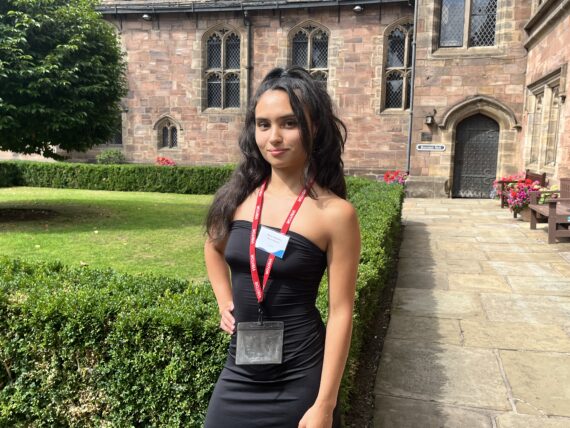Chetham’s Alumni Spotlight: Maria Rivas on Music and Philosophy

While music is at the heart of Chetham’s, our students go on to excel in many different fields – from medicine and law to architecture, science, politics and the arts. The benefits of a musical education reach far beyond the practice room: it builds discipline, communication skills, confidence and creativity. These qualities give Chetham’s students a strong foundation for their future lives and careers, wherever their paths may lead.
Maria Rivas studied cello at Chetham’s from 2014 to 2019 and is now pursuing a PhD in Philosophy of Science at the University of Salamanca. Her research explores patient participation and risk management in mental health. Last month she returned to Manchester to deliver a paper at a bioethics and philosophy of medicine conference, and she couldn’t resist stopping by her old school. We asked Maria about her passion for philosophy and how her musical training continues to shape her journey.
“For a long time, I was convinced I would go to a conservatoire in London, but in my last two years at Chetham’s I decided on Philosophy,” she says. Law was also an option, until her English teacher, Mrs Harrison, explained that philosophy could be a strong foundation for legal studies. “She told me about how Marx and Engels had researched here in Chetham’s Library. There’s so much history here, and it’s an inspiring place to think about philosophy.”
Maria believes much of her academic success stems from what she learned through music. “Studying music is ideal for the academic world. It gives you discipline and a good routine, which you need every day with your instrument. Many PhD students don’t have that. As a musician, you learn how to focus your attention on what matters. And through performing, you learn how to communicate your ideas to an audience.”
For Maria, music and philosophy are deeply connected. “There are aspects of music theory and performance practice that are closely related to my thesis, and to philosophy as a whole. Western philosophy emerged in Greece, with thinkers like Pythagoras exploring the links between geometry and harmony. Music is really at the root of my studies.”
Although she chose not to pursue cello professionally, music remains essential to her life. “At university I had to face the reality that I wasn’t going to dedicate myself to music full time. At first, I didn’t understand what life would look like without eight hours of practice a day, or without presenting myself as a cellist. But if you’re passionate about what you do – philosophy in my case – you gradually realise you’ve made the right choice. Still, I need music to live!”
Maria continues to play with her twin sister, who also studied at Chetham’s. “Your instrument never disappears from your life,” she says. “It will always be a very big part of you.”
It’s amazing where a musical education can take you!
Are you a young musician inspired by the success of our alumni? Join us for our next Open Day or book an Advice Audition today.



